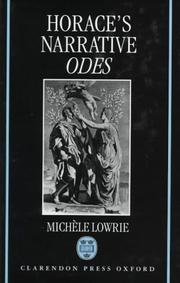| Listing 1 - 2 of 2 |
Sort by
|
Book
ISBN: 9783700181057 3700181051 Year: 2018 Volume: 39 Publisher: Wien Verlag der Österreichischen Akademie der Wissenschaften
Abstract | Keywords | Export | Availability | Bookmark
 Loading...
Loading...Choose an application
- Reference Manager
- EndNote
- RefWorks (Direct export to RefWorks)
"Diese Arbeit hat es sich zum Ziel gesetzt, für die nach mehr als einem Jahrhundert intensiver philologischer Debatte immer noch ungeklärte "Cirisfrage" eine plausible Lösung anzubieten. Nach so langer Zeit kann als (fast) allgemein akzeptiert nämlich lediglich gelten, dass das schon in der Suetonvita Vergil zugeschriebene neoterische Epyllion über die leidenschaftliche, letztlich verhängnisvolle Liebe der Scylla zum Landesfeind Minos nicht von diesem Dichter stammt. Die bislang für das Werk vorgeschlagenen Datierungen reichen von der Mitte des ersten vorchristlichen bis ins dritte nachchristliche Jahrhundert, ein Befund, der eine neuerliche, gründliche Behandlung dieses Problems herausfordert. Die alleinige Grundlage chronologischer Aussagen können auch in dieser Arbeit nur die zahlreichen Textparallelen zwischen der Ciris und einer großen Zahl anderer Autoren bilden. Im Vergleich mit den vorliegenden Cirisstudien werden hier aber zusätzlich bislang unbeachtete Cirisparallelen bei Vergil und Ovid sowie auch Vergleichsstellen bei Horaz, Tibull und Properz, in Catalepton 9 und im Panegyricus Messalae zeitlich ausgewertet. Prioritätsentscheidungen werden nicht nur nach den traditionellen Kriterien getroffen, sondern auch und vor allem anhand einer Reihe vorwiegend formaler Phänomene, die der Verfasser bei der jahrelangen Analyse von Similienpaaren mit von Haus aus sicherer Dependenz als auffallend häufige Erscheinungen just an Sekundärstellen ermittelt und in der Folge auch schon zur Klärung fraglicher Prioritätslagen herangezogen hat. Die Erweiterung des untersuchten Referenzmaterials und dessen Bewertung auch mithilfe dieser neuen, objektiven Kriterien sollte dem erzielten Ergebnis hinlängliche Sicherheit verleihen: Die Ciris ist zweifellos ein Produkt der augusteischen Epoche, dessen Autor niemand Geringerer als Asinius Pollio sein dürfte."-- "This study aims at solving a problem that has been puzzling generations of philologists up to the present day. After nearly a century of emotional debate one of its protagonists could not but declare "the Cirisfrage ... still of course wide open" (R.O.A.M. Lyne 1978). The dates suggested for the neoteric epyllion about Scylla's fatal passion for Minos range from the mid-first century B.C. to the third century A.D., scholars agreeing nowadays almost (!) universally only that this part of the Appendix Vergiliana is not by Virgil. Under these circumstances, a fresh effort to overcome the present deadlock by mustering up more texts of reference and applying new standards of evaluation may not seem inappropriate. Dating the Ciris correctly solely depends on a correct interpretation of the countless striking parallels in the epyllion with works of nearly all the prominent Latin poets, above all of the Augustan era. In order to achieve utmost impartiality of judgement the author employs not only traditional criteria of chronological priority, but also newly established ones: he makes use of a number of phenomena that he recognised as being typical of quotations in pairs of similia whose chronological relationship is uncontested. Moreover, textual similarities to the Ciris that were hitherto overlooked (or deliberately neglected) are analysed and exploited. Thus, the results of this study seem to be well-grounded: the Ciris was written in the year 26 B.C., probably by Asinius Pollio."--
Latin poetry --- Narrative poetry, Latin --- Authorship, Disputed. --- History and criticism. --- Pollio, Gaius Asinius, --- Virgil --- Authorship. --- Ciris. --- Authorship, Disputed --- History and criticism --- Authorship --- Ciris --- Latin poetry - History and criticism --- Narrative poetry, Latin - History and criticism --- Pollio, Gaius Asinius, - 76 B.C.-4 A.D. - Authorship. --- Virgil - Authorship --- Pollio, Gaius Asinius, - 76 B.C.-4 A.D.

ISBN: 0198150539 9780198150534 Year: 1997 Volume: *26 Publisher: Oxford Clarendon
Abstract | Keywords | Export | Availability | Bookmark
 Loading...
Loading...Choose an application
- Reference Manager
- EndNote
- RefWorks (Direct export to RefWorks)
Laudatory poetry, Latin --- Verse satire, Latin --- Narration (Rhetoric) --- Rhetoric, Ancient --- Poésie élogieuse latine --- Poésie satirique latine --- Narration --- Rhétorique ancienne --- History and criticism --- Histoire et critique --- Horace. --- Rome --- Rome dans la littérature --- In literature --- Narrative poetry, Latin --- Odes, Latin --- Rhetoric, Ancient. --- History and criticism. --- History --- Odes --- In literature. --- Poésie élogieuse latine --- Poésie satirique latine --- Rhétorique ancienne --- Rome dans la littérature --- Ancient rhetoric --- Classical languages --- Greek language --- Greek rhetoric --- Latin language --- Latin rhetoric --- Latin narrative poetry --- Latin poetry --- Rhetoric --- Horace --- Discourse analysis, Narrative --- Narratees (Rhetoric) --- Narrative poetry, Latin - History and criticism. --- Laudatory poetry, Latin - History and criticism. --- Verse satire, Latin - History and criticism. --- Narration (Rhetoric) - History - To 1500. --- Odes, Latin - History and criticism.
| Listing 1 - 2 of 2 |
Sort by
|

 Search
Search Feedback
Feedback About UniCat
About UniCat  Help
Help News
News